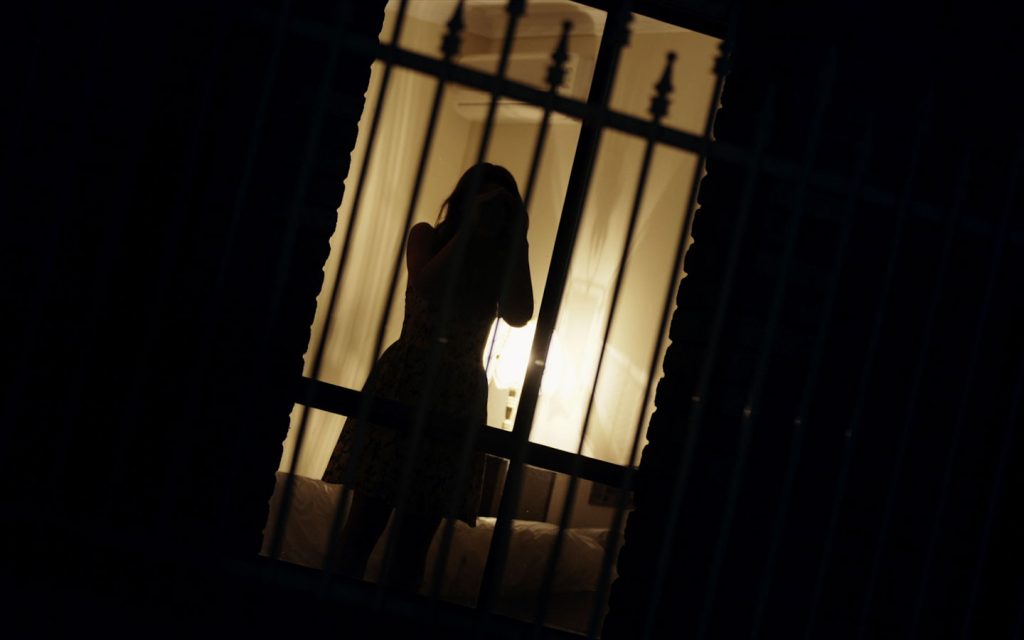The dark opening sequence hangs heavily over the rural idyll shown in 3rd Night. Somewhere between B-movie and video nasty, a little girl is running around the woods, with the industry standard grisly event; but the soundtrack is brilliantly disturbing and unearthly, and the pace is well-judged. The nursery rhyme the child is singing drives everything else that unfolds in this movie.
The story begins with couple Meagan and Jonathan (Jesse McGinn, Robert Hartburn) moving to an orchard farm in order to escape the pressures of urban life – and yes, start a family. We’ve heard this before, but the writer-director puts it across neatly using natural dialogue and screenplay, without resorting to lazy tropes. The resulting pregnancy is not played so well by writer-director Adam Graveley, with morning sickness (eight hours after conception?), and the obligatory bathroom scene with a pink stick. The couple’s cat, meanwhile, has gone walkabout to inspect his new lands. As it says on the merch: “Here, kitty kitty…”
The next morning the couple find a note – as they do on each of the three mornings (3rd Night, you see?). He laughs it off as kids messing about; she worries. More tension. The dynamic between Jonathan and Meagan is excellent throughout – and it peaks in a compelling kitchen scene on the second (sorry, “2nd”) night where McGinn really takes the viewer on a journey.
It soon becomes clear there is someone watching as well as leaving daft notes. The voyeuristic scenes are mostly well-handled, although there is one sequence which seems overplayed even considering the intent to establish character. The voyeur’s point of view mixes well with the excellent sense of claustrophobia in the interior of the farmhouse, achieved through practical lighting and clever shot choice. The tension is ramped up by cinematographer Daniel Holliday using reflections in unusual surfaces as well as the traditional mirror shot, so essential in this genre. The great outdoors, drowning in sunlight and fruit, adds contrast neatly. However, there are scenes where an idea in photography or editing takes over from actual movie-making.
It also emerges there is a middle-aged guy living off the land nearby (Bruce Denny) with a sidekick and mentee youth (Connor Gosatti). Both actors do a lot with a little; the establishing monologue in this strand is poor, but well rescued by Denny.
The viewer will guess that all this comes together at the end of the third act, but not how you would expect; the twist for the epilogue is neat and that in turn builds for an excellent final shot.
The movie poster informs us that Graveley wrote, directed, produced, and cut; but sound is half the picture – “sometimes 55 or 60 per cent” he says at the premiere – and he edited alongside heavy input into Tim Count’s sometimes Carpenter-esque soundtrack. A particularly brilliant scene includes another genre essential, a waterphone, especially built by Count.
This is a first feature, and some crew had to fit this around their day jobs. Possibly as a result there are gaps which force clumsy set-ups and shortcuts in the screenplay; sadly, an early one of these is key to the final shot. This is a shame because this has the potential to be a great B-movie and there is plenty to like; the whole works despite missing parts, and Graveley will shine with a bigger budget and more time.
Written and Directed by: Adam Graveley
Stars: Jesse McGinn, Robert Hartburn, Bruce Denny, Rose McKenna
